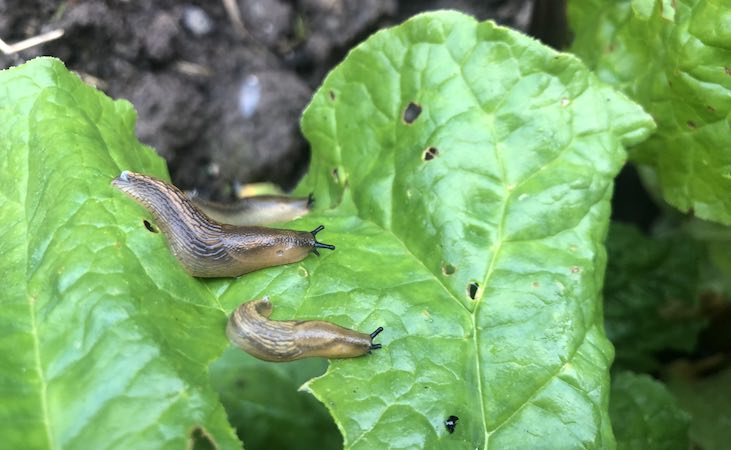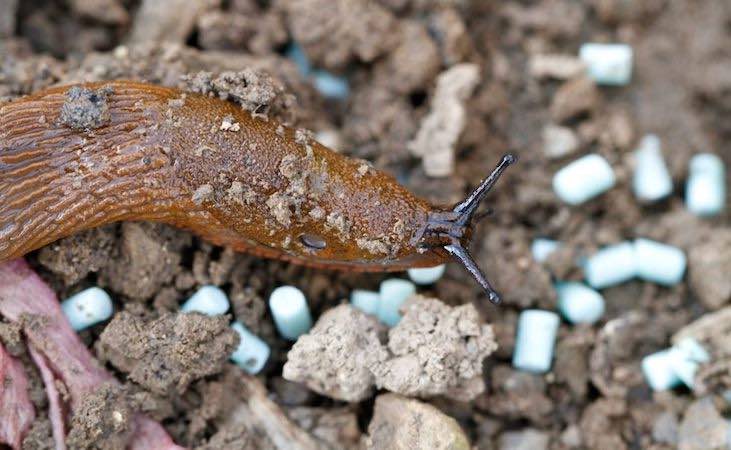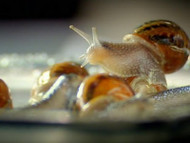Natural Slug Control - Non Toxic Methods
Slug control is an on-going battle for us gardeners, and it seems that you are never quite free of them. What makes them so formidable is that they are hermaphroditic and their eggs can lay dormant in the soil for years. Slugs and snails can destroy foliage faster than the plants can grow, which makes them a formidable adversary - particularly when it comes to young and vulnerable crops.

How to get rid of slugs in the garden organically:
It can be quite a messy business getting rid of them, so here we have a list of some non toxic slug control methods. Very few methods of deterring slugs (aside from picking up and removing the little buggers yourself) are going to be foolproof, so don't expect miracles from some of the solutions or natural remedies you may read about - coffee grounds, eggshells, wood chips etc. Even many of the more proven methods won't work on all slugs all the time, but they can certainly help.
- Keep your garden tidy and clear under & around plants (stones, debris etc.) - slugs like to hide out of sight during their off hours, and you will often find them chilling under plant pots. Unkempt areas of the garden have some very good benefits, but if you have a slug problem you will want to do some tidying. They tend to populate under rocks, wood or other material that provide them with a dark, damp hiding place.
- Nematodes - Nematodes are microscopic worms that aggressively pursue different types of insects and pests. They occur naturally in the soil, but for a severe slug infestation it's better to purchase a 'concentrated dose' of them, so to speak. Packs can be bought from garden stores or online; they are known as 'biological pest control' and there will be certain varieties that are designed for your chosen pest. One application can release enough nematodes to control slugs for about six weeks. Nematodes are light sensitive, so unleash them in the early morning or at dusk.
View Article: Pest Prevention in an Organic Garden
- By hand - Maybe the most effective and natural method of all is the hands-on approach. This means seeking out snails in the garden, picking them up (not so easy if you're squeamish) and relocating them. Snails are nocturnal creatures and they favour damp, moist conditions. Therefore, the best times to do this are at dusk (bring a head-torch and pretend you're raving while you're at it), in the early morning or when it has just rained. Be aware that slugs and snails have a homing instinct, so make sure to relocate them a good 20 metres or so if you don't want to see them back again in time for breakfast.

- Iron phosphate pellets - Be very careful when using slug pellets, as those that are metaldehyde-based can harm wildlife, birds etc, as well as having the potential to fatally poison dogs. The use of these has been largely phased out or discouraged in gardens. Some more modern alternatives have been developed that are advertised as being pet and wildlife friendly, but should still be used with caution. These feature iron phosphate, or ferric phosphate, as the main ingredient. They completely disrupt the slug's digestive system, adding iron into the soil while they're at it. We find Growing success organic slug bait to be one of the most effective products. For best results, you should use these pellets after a spell of rain. Not only are slugs more active in wet or moist conditions, but the pellets are rain resistant and will swell up when damp to make them more attractive to slugs. Make sure to follow the label instructions and only use them in the event of a serious slug infestation.
- Use bran instead of salt - Salt ruins the soil and is harmful to a lot of wildlife and plants. Use Bran instead: spread a line of it around your plants or in jars lying on their side. Slugs are very partial to bran and will keep munching away on it to the point where they may well ignore your (otherwise enticing) crops.
- Garlic based slug control - make a solution and spray on and around plants. Try our Garlic Wonder Organic Pest Spray: Endorsed by gardening author Klaus Leitenberger, the solution is absorbed through the root system, stimulating growth as well as confusing slugs to the point they go elsewhere. Bear in mind that for garlic sprays to really have an effect, you need to keep re-applying them regularly.
- Seaweed - mulching some seaweed around the base of your plants is beneficial for many reasons; perhaps a less discussed effect is that the high salt content can deter slugs.
- Grow in pots - If your garden is teeming with slugs, it can be a good idea to start your plants out in pots as much as is practical, and allow them to become established before planting them out. Once established they will be better able to withstand slug damage.
- Change watering strategy - Water early in the day so that soil is well dried by evening. Snails have nocturnal habits and dry soil will be less attractive to them.
- Ground Beetles - Ground beetles have a voracious appetite for slugs and other invertebrates. Unfortunately the methods for attracting them to your garden (log piles, shelter etc) can also attract slugs, so that may be self-defeating. However, not disturbing the soil as much as possible will ensure that you're leaving the ground beetles to do their work.

- Beer - Beer traps are regarded as one of the more effective home remedies. Slugs are attracted to the scent of yeast (a cup with sugar or yeast with hot water will also lure them just as well). Beer traps can be homemade, or you can purchase something like The Slug X Beer Trap, which will trap dozens of slugs and snails. Hopefully they die happy and drunk.
- Keep Ducks - In the event of a serious slug invasion, it might not be the worst idea to invest in some ducks. They can make short work of slugs, and although you might need to keep an eye on them otherwise, they generally aren't known for hassling vegetable crops. As a bonus you can avail of duck eggs and manure. 'Runner ducks' are particularly fond of slugs and snails.
- Vigorously hoe the soil regularly - This smashes snails eggs, which can lay dormant for years.
- Copper strip/copper mesh barrier - Copper placed around plants reacts with the slug's slime to give them a mild electric shock or jolt.
- Make your garden frog and toad friendly - Frogs, toads and newts find snails very tasty and eat a lot of them. Damp shady spots are often recommended for frogs, but of course damp shady spots can also attract slugs so that's a bit of a catch 22. A garden pond can provide the perfect environment if you have the space.
View Product: Copper Slug Tape - 4m
- Sacrificial Plants - Marigold is a great option to plant as a decoy; this will attract slugs away from your other crops, and when they've populated enough on the leaves you can remove them from your garden in bulk. For further effectiveness place some beer traps around the marigold.
- Put a plank of wood or bits of wet carpet between raised beds - slugs will hide from the sun under the wood or carpet. Pick them off during the day.
- Citrus Rinds - Lemon, grapefruit or orange rinds can divert the slugs' attention away from your crops and allow you to round them up easier.
- Ammonia or vinegar - 1 part ammonia to 10 parts water for seedlings and tender young plants, adjust ratio accordingly) - Dries out and kills slugs and doesn't burn foliage.
